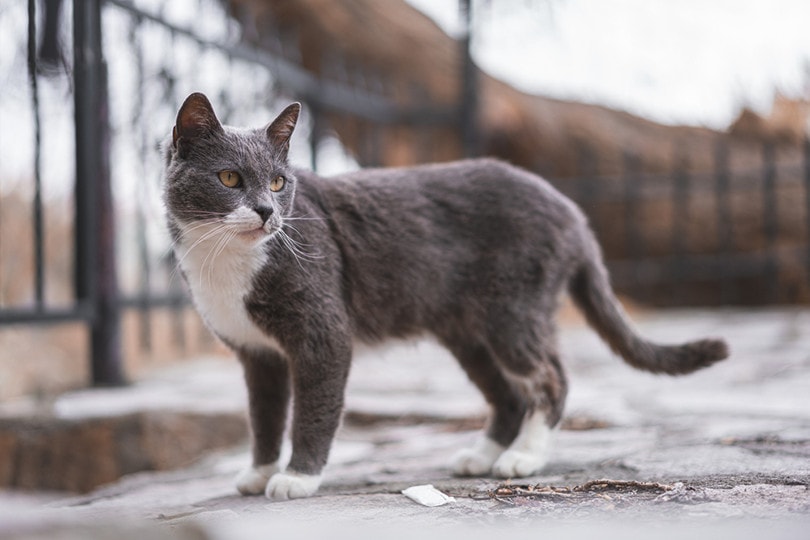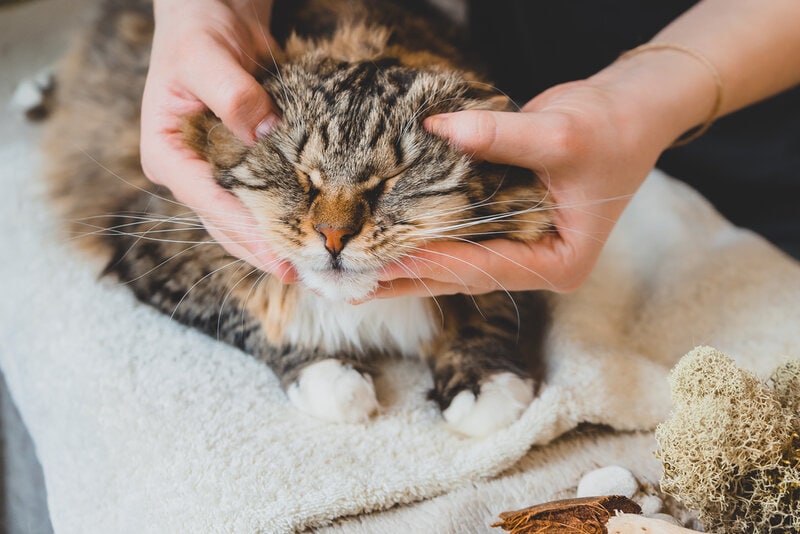VET APPROVED

The information is current and up-to-date in accordance with the latest veterinarian research.
Learn more »Click to Skip Ahead
Bringing home a new cat is an exciting event. The entire family will be ready to shower the new kitty with love. While it should be fun and games for everyone involved, there are also big decisions that must be made. What cat food will you use? What’s the perfect name? Will your new kitty be an indoor or outdoor cat?
Yes, the question of whether a cat will live inside or prowl the great outdoors is a debate many people have when bringing a new feline home. Some cats simply adore being outside. But is it truly good for them? How long do outdoor cats live compared to indoor ones? Unfortunately, this is not a straightforward question to answer due to many variables, including where you live.
Generally, the average lifespan of a cat is 13 to 17 years. According to petMD1, cats with unsupervised and unlimited outdoor access may unfortunately find this average lifespan halved due to the increased dangers of the outdoors .
Let’s take a deeper look at the differences between the lifespans of indoor and outdoor cats as well as a few of the factors that come into play. Hopefully, this will help you make the best decision for your cat.

Cats and the Outdoors
If you’ve had cats before, you know how obsessed they are with looking out the windows. It’s natural for cats to chatter at birds, squirrels, and other wildlife they see considering they are hunters. This is why your cat will act insane when a mouse gets into your home or even a bug. With so many cats showing an affinity for being outside, many owners decide to let their kitties live out there permanently or on a part-time basis. Unfortunately, as we’ve mentioned, this can reduce their average life expectancy.
The Dangers of Outdoor Life for Cats
Now that we’ve talked about why cats like it outdoors, let’s take a look at why being outdoors may reduce or even halve their life expectancy. There are tons of dangers a cat that lives outdoors must face and some of these will be dependent on where you live and how busy the traffic is, for example. While we may not cover every one of them, let’s take a look at some of the most pressing below.
- Outside cats are at risk of being hit by cars.
- An outdoor cat can roam too far and become lost or picked up by animal control.
- Lawn chemicals and pesticides can be dangerous to cats.
- Aggressive cats may attack your cat and injure them.
- Unvaccinated animals can expose your cat to illnesses and rabies.
- Certain animals can be dangerous to outdoor cats such as foxes, coyotes, raccoons, hawks, and even some dogs.
- Outdoor cats can get stuck in places such as a neighbor’s garage or shed.
- Cold weather can cause your cat frostbite or other issues.
- Extreme heat can cause overheating.
- Parasites such as worms, fleas, and ticks can infest your cat and cause lots of discomfort.
- If your cat is a female that is not spayed, you’ll soon find that she will be pregnant with an unwanted litter.
Some things you can do to decrease some of these risks and increase your cat’s life expectancy if you choose to let them outdoors:
- Keep your cat up to date with their vaccinations.
- Keep them up to date with flea and worm preventative treatments.
- Have regular vet checkups.
- Keep them indoors at night.
- Make sure your cat is microchipped in case they get lost.


The 5 Ways to Keep an Inside Cat Happy
Yes, your inside cat may show signs that they’d like to explore outside, but you can make things just as exciting inside for them. This will keep them safer and keep you from worrying yourself silly.
1. Lots of Toys
Cats are natural predators. Toys are a great way of allowing them to imitate hunting like they would in the wild. Feather toys, pounce toys, and even tunnels can help cats imitate what they would do outside and keep them from wanting to slip out there for fun.
2. Scratching Posts
Cats scratch to mark their territory and sharpen their claws. An outdoor cat will do this all around the area. Buying your cat a scratching post will allow them to do these natural actions around the house without feeling like they should go outside to do them.
As another option, if you're looking to give your cat something exciting, we know of an awesome scratcher that both encourages play and doubles as a stylish modern furniture piece. The Hepper Hi-Lo Cat Scratcher is designed with a curved shape for dynamic movement, is built to last with safe and sturdy birch plywood and thick cardboard, and offers three height options to ensure your cat enjoys the exercise, elevation, and excitement they crave ... and, it's affordable!
At PangoVet, we've admired Hepper for many years, and decided to take a controlling ownership interest so that we could benefit from the outstanding designs of this cool cat company!
3. Climbing
Cats love to climb. They also like watching prey from above. Climbing is a great way of stimulating cats and giving them exercise. You can buy cat trees or even make walkways on the walls for your cats to utilize. This can keep them from wanting to wander for the climbing fun they yearn for.
4. A Hideaway
We all know cats need their own space to hide away when they are tired, stressed, or simply over us. If you provide your cat a spot in the house that works for this need, they won’t want to go outside and explore for one.
5. A Leash
If your cat simply can’t remain indoors all the time, instead of simply turning them loose, teach them to walk with a leash and harness. This will let them get a bit of stimulation, exploration, and fresh air safely.


Final Thoughts
Yes, it’s natural for cats to be interested in what’s happening outside. Unfortunately, having access to the outdoors can increase their exposure to many dangers, which can decrease their lifespan. If your cat does go outdoors you can reduce some of these risks with regular preventive healthcare, such as parasite treatments and vaccinations. It is safer to keep your kitty indoors where you can keep a close eye on them. Thankfully, there are ways you can make life exciting inside so your cat doesn’t suffer from the outdoor yearning blues.
Featured Image Credit: Therese Elaine, Shutterstock












